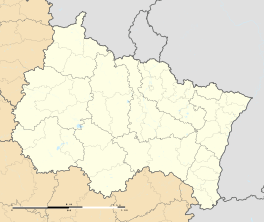Portieux
| Portieux | |
|---|---|
 Portieux | |
|
Location within Grand Est region  Portieux | |
| Coordinates: 48°20′40″N 6°20′44″E / 48.3444°N 6.3456°ECoordinates: 48°20′40″N 6°20′44″E / 48.3444°N 6.3456°E | |
| Country | France |
| Region | Grand Est |
| Department | Vosges |
| Arrondissement | Épinal |
| Canton | Charmes |
| Intercommunality | Association of middle Moselle communes |
| Government | |
| • Mayor (2008–2014) | Philippe Aussedat |
| Area1 | 7.9 km2 (3.1 sq mi) |
| Population (2006)2 | 1,335 |
| • Density | 170/km2 (440/sq mi) |
| Time zone | CET (UTC+1) |
| • Summer (DST) | CEST (UTC+2) |
| INSEE/Postal code | 88355 / 88330 |
| Elevation |
275–363 m (902–1,191 ft) (avg. 296 m or 971 ft) |
|
1 French Land Register data, which excludes lakes, ponds, glaciers > 1 km² (0.386 sq mi or 247 acres) and river estuaries. 2 Population without double counting: residents of multiple communes (e.g., students and military personnel) only counted once. | |
Portieux is a commune in the Vosges department in Grand Est in northeastern France.
Inhabitants are called Portessiens.
Geography
The traditional village of Portieux sits on the right bank of the Moselle 4 kilometres (2 mi) upstream from Charmes and across the river from Vincey. About 4 kilometres (2 mi) inland, to the east, is a substantial glass works.
History
Formerly known by its Latin name, Portus Coelorum, the little town grew up around a priory founded in 1107 by Gérard of Vaudémont, which relocated to Nancy in 1616.
The town got a second chance at the start of the eighteenth century courtesy of the Dukes of Lorraine. In 1705 Duke Leopold rewarded his faithful, courageous and devoted steward by granting him the right to establish a glass works on the edge of the forest at Portieux. François Magnien amply justified his patron's generosity: the enterprise quickly grew and acquired fame across Europe. It continues to flourish.
See also
References
| Wikimedia Commons has media related to Portieux. |